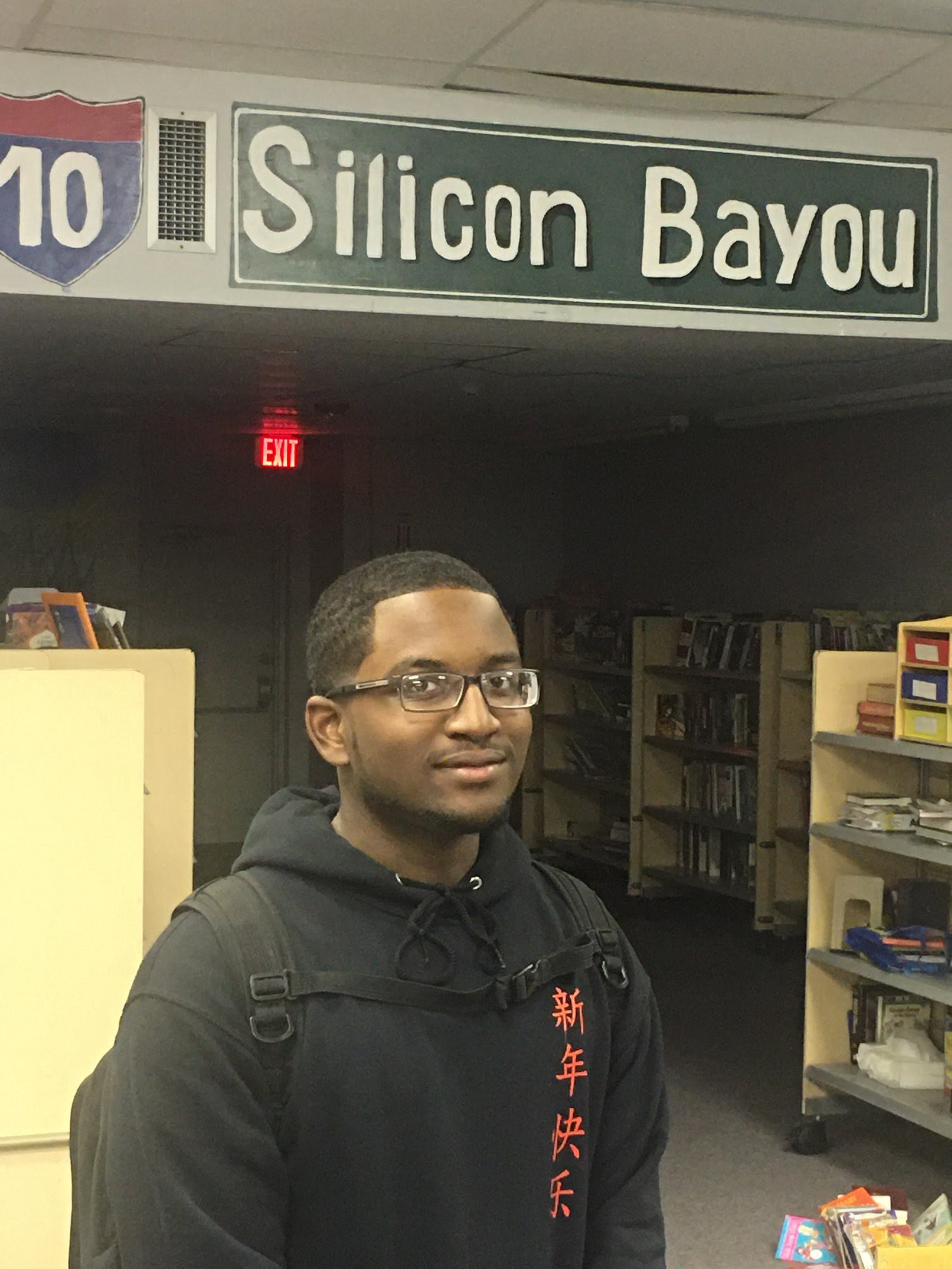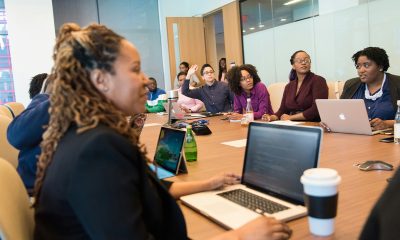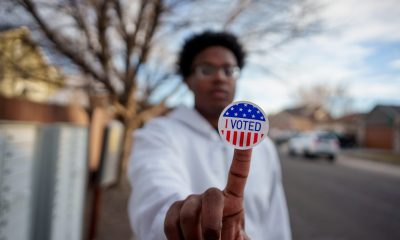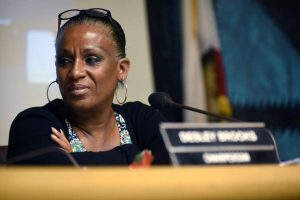#NNPA BlackPress
‘We Are Intelligent’
NNPA NEWSWIRE — T.M. Landry is a year-round, tuition-based, nonpublic school which began in 2005. The school has a unique model to educate students. It is a combination of rigorous courses, self-autonomy, self-efficacy, and a demand for master learning, said co-founders Michael and Tracey Landry. According to its website, the school is designed for students who want to “pursue a serious, purposeful education” and achieve success in college and beyond.
T.M. Landry students, teachers use self-efficacy to master learning
By Candace J. Semien, Jozef Syndicate Reporter, The Drum / NNPA
LAFAYETTE—The excitement in Marjorie Coulanges’s voice is unmistakable. For two years, her son Nicholas has lived three states away, attending a small, private academy. A week before Christmas 2019, Coulanges is awaiting her son’s visit, full of smiles, confident in his academic and social growth. She said this growth was not happening in the Miami, Florida, high school he attended before moving to T.M. Landry College Prep Academy in Lafayette, Louisiana.
T.M. Landry is a year-round, tuition-based, nonpublic school which began in 2005. The school has a unique model to educate students. It is a combination of rigorous courses, self-autonomy, self-efficacy, and a demand for master learning, said co-founders Michael and Tracey Landry. According to its website, the school is designed for students who want to “pursue a serious, purposeful education” and achieve success in college and beyond.
“Coming from the neighborhood where we grew up, most Black kids weren’t truly being educated,” said Michael Landry. “We wanted to try to help kids who society didn’t believe have the potential of becoming educated or who were interested in learning.”
“Nicolas wasn’t doing anything,” Coulanges admitted. The full-time nurse explained that an episode of the Ellen Show led her to research and visit the school where she interviewed the school’s founders, talked with students, then ultimately chose to relocate her son. “I was very serious about this. I could not make a mistake with my son’s future,” said Coulange.
“It’s just amazing!” She said. “He’s gotten back to his love of mathematics again and has matured so much.” Next year, Nicholas Delatour will graduate from T.M. Landry with As in pre-calculus and physics and a C in calculus I from the University of Louisiana at Lafayette where he completed dual enrollment courses. He has received early action from St. John’s University in New York and is waiting on responses from other highly competitive universities where he plans to study number theory.
(Nicholas Delatour)
His handshake is firm and eye-contact direct when he shares how being a student at T.M Landry changed the trajectory of his life. “I had no ambition. No goals. I was just drifting by,” he said. “This school has impacted me more in a year than 15 years in public education has. Now I want to learn more. Mr. Mike helped me release my confidence in my ability.”
Last fall, Devon Hill, eight grader, watched as her older classmates introduced themselves and discussed their first days at T.M. Landry. They all were given The Power of Positive Thinking by Norman Vincent Peale as one of their first reading assignments. One tenth grade student said the book changed how she was thinking about herself. Devon’s older brother, Hunter, said he uses the book as daily motivation even though it is not assigned. He said he remembered visiting the school and meeting students who talked boldly about their plans to attend Ivy League and Top 50 universities. When he started T.M. Landry, his self-esteem was low, and it’s improved. “Before now, I would’ve told you that there was no way. I couldn’t see my self stepping up. (Now,) I see so many opportunities.”
Devon smiled in agreement but said her first experience had nothing to do with reading. She was adjusting. For the first time “in a long time” she was at a school and no one was bullying her, she said. “It’s such a breath of fresh air. Every time I walk in the door, it’s a family. It doesn’t matter race or gender. They are all constantly supporting one another,” said Desaix Hill, Devon and Hunter’s mother.
“We went from a kid who was anxious to one who was happy and confident, who knows the sky is the limit,” said Lanier Cordell, the Hills’s grandmother.
Education scholars like Erin Wheeler Ph.D., executive director of College Beyond, and Calvin Mackie Ph.D. of STEM NOLA have said a student’s “belief” is critical for their success. This belief, which is called “self-efficacy,” is the belief in one’s ability to complete a chosen, specific task, Wheeler explained.
“That is what fuels students. Once they believe, then, anything else is possible,” said Tracey Landry who is completing doctoral studies is on educational leadership. “With self-efficacy, students of color will typically become engaged in the (education) process and that leads to learning. We have to tap into it. We have to let them know they can achieve. Self-efficacy is everything.”
Preparing Master Learners
Imagine walking into a converted skating rink with a high ceiling where college flags hang, Mac desktops line one wall for students to work and check the stock market. Long black tables and chairs line that adjacent wall where lunch is served and where upperclassmen work on college assignments. The day begins with every student participating in a morning meeting, which is a process the founders pulled from Corporate America. They all don their red, grey, and white uniform. One student is selected to start the day by motivating the student body. “We want the kids to be prepared for careers,” said Michael Landry. “It’s part of developing master learners.”

Nicholas Delatour
After the meeting, students are dismissed to class. Only one wall separates the students. Middle and elementary students occupy one side, high schoolers the other. There are no other classroom walls or partitions. Teachers—a total of four at any given moment—stand in front of roll-a-way whiteboards and chalkboards teaching small groups of students who sit a foot or two from the teachers.
Before leaving for the day, the students select their class schedule for the next day based on their needs. If a student feels behind in a writing assignment, they can choose to take a half day with that teacher to not fall behind, explained Michael Landry. Students who are interested in attending the school are invited to spend two days in classes before applying. Once admitted, they are given a few weeks, if necessary, to adjust to the school culture, said Tracey Landry.
‘It is a Luxury’
Unlearning what education and learning should look like and how schools should operate can be a hurdle for parents, Tracey Landry said.
“I had to trust their model. It was something I had not seen before and it was working for other students. I just had to trust,” said Coulanges. “I’m glad I did. What Mike and Tracey have given to him with this school, I could not give to him.”
“This is not a school for every kid. Not a set structure. They set goals and focus on what is learned and not what is covered. Everything here is a unique experience. There’s a lot of focus on the kids and it’s self-directed… It is a luxury here. I am surprised it is not overcrowded,” said Cordell who has been at the school for two years.
One ‘luxury’ the students interviewed agreed on is having administrators who “really care.” “They want the best for us,” Delatour said.
High schoolers said they often call the Landrys with questions even until early morning, on weekends, and during holidays. And Michael Landry said the calls are encouraged. “We don’t want to stop that fire (for learning),” Michael Landry said.
The school stays open on weekdays until 7pm and teachers are available until 6pm to assist students. “The whole time they are here, these students are doing work,” said Cordell who often waits for Hunter and Devin until the evening before heading home 30-miles away.
“We stay and get as much as we need. If we are missing something we know we can stay and until we learn it…and we teach each other,” said Gailen George, a senior who said he initially tried to get kicked out of the school, but now he “owns” his education.
This self-direction and self-autonomy is a challenge for students and their parents upon admission, Tracey Landry admitted. Once the student understands their education is “up to them and they are supported and challenged while they are here, then they will come to task and push themselves,” Michael Landry said.
In Multiplication is for White People, Lisa Delpit, Ph.D., explained, “Many of our children of color don’t learn from a teacher, as much as for a teacher. They don’t want to disappoint a teacher who they feel believes in them… It is the trust that students place in these strong teachers that allows them to believe in themselves. It is the teachers’ strength and commitment that give students the security to risk taking the chance to learn.
Wheeler said when a student believes that they can complete a certain task with success, they begin to discipline themselves accordingly by applying the right effort and seeking help. Specifically, she found that self-efficacy strengthens the academic performance of college students who are studying biology. Other research has shown that building self-efficacy for non-white or underserved students is critical and has significant impact on academic success, she said. “All students have a measure of self-efficacy. Some students have a lesser sense because of their environment.”
Cordell said from what she has experienced at T.M. Landry, opportunities “for minorities are astonishing. This school, Mike and Tracey, it all changes the students’ views about what their own potential is,” she said. She, Colanges, and Hill said T.M. Landry has exceeded their expectations.
2019 T.M Landry Scholars Heading to Top Colleges, Again
As a nonpublic school, the school does not receive state and federal funding and does not seek state approval. However, to maintain transparency and alignment with state standards, a new board of directors reinforces administrative policies and financial governances, said board member Linda Johnson. These measurements, as well as the consistent success of T.M. Landry high school students in college courses and on tests, have helped the school sustain its relationship with admissions departments at top universities nationwide, said board president Greg Davis.
In December 2019, six of eight seniors received early action letters from universities, and eighth through tenth graders earned ACT scores ranging from 19 to 28. Five sophomore enrolled in dual enrollment classes at Southern University and A&M College in Baton Rouge earned As in college algebra and pre-calculus, while six other students attended the University of Louisiana at Lafayette, earning As and Bs in calculus II, conceptual physics, precalculus trigonometry, and college algebra and also Cs in physics with calculus and calculus I and II.
Of the school’s 49 graduates, 40 have graduated from college or are currently in college at schools including NYU, Harvard, ULL, Southern, Stanford, and Brown. According to school records provided by Davis, 71% of elementary and middle school students performed at or above grade level for the 2018-2019 school year. These were results from TerraNova tests which is a nationally-normed, standardized achievement test that meets most states’ annual testing requirements.
“Our number one goal has been educating kids. We know all students are capable of performing at the highest level academically no matter what their social-economic background is. All kids. All kids are capable,” Michael Landry said.
Administrators said they plan to restart its free Saturday tutoring for students from other schools. “It’s not about T.M. Landry or this school over that one. It’s about how students from Southwest Louisiana can show the world that we are intelligent,” Michael Landry said.
#NNPA BlackPress
Beloved Actor and Activist Louis Cameron Gossett Jr. Dies at 87
NNPA NEWSWIRE — Louis Gossett Jr., the groundbreaking actor whose career spanned over five decades and who became the first Black actor to win an Academy Award as Best Supporting Actor for his memorable role in “An Officer and a Gentleman,” has died. Gossett, who was born on May 27, 1936, in Brooklyn, N.Y., was 87. Recognized early on for his resilience and nearly unmatched determination, Gossett arrived in Los Angeles in 1967 after a stint on Broadway.
The post Beloved Actor and Activist Louis Cameron Gossett Jr. Dies at 87 first appeared on BlackPressUSA.

By Stacy M. Brown
NNPA Newswire Senior National Correspondent
@StacyBrownMedia
Louis Gossett Jr., the groundbreaking actor whose career spanned over five decades and who became the first Black actor to win an Academy Award as Best Supporting Actor for his memorable role in “An Officer and a Gentleman,” has died. Gossett, who was born on May 27, 1936, in Brooklyn, N.Y., was 87. Recognized early on for his resilience and nearly unmatched determination, Gossett arrived in Los Angeles in 1967 after a stint on Broadway.
He sometimes spoke of being pulled over by law enforcement en route to Beverly Hills, once being handcuffed to a tree, which he remembered as a jarring introduction to the racial tensions of Hollywood. In his memoir “An Actor and a Gentleman,” Gossett recounted the ordeal, noting the challenges faced by Black artists in the industry. Despite the hurdles, Gossett’s talent shone brightly, earning him acclaim in groundbreaking productions such as “A Raisin in the Sun” alongside Sidney Poitier. His Emmy-winning portrayal of Fiddler in “Roots” solidified his status as a trailblazer, navigating a landscape fraught with racial prejudice.
According to the HistoryMakers, which interviewed him in 2005, Gossett’s journey into the limelight began during his formative years at PS 135 and Mark Twain Junior High School, where he demonstrated early leadership as the student body president. His passion for the arts blossomed when he starred in a “You Can’t Take It With You” production at Abraham Lincoln High School, catching the attention of talent scouts who propelled him onto Broadway’s stage in “Take A Giant Step.” His stellar performance earned him the prestigious Donaldson Award for Best Newcomer to Theatre in 1952. Though initially drawn to sports, Gossett’s towering 6’4” frame and athletic prowess led him to receive a basketball scholarship at New York University. Despite being drafted by the New York Knicks in 1958, Gossett pursued his love for acting, honing his craft at The Actors Studio under the tutelage of luminaries like John Sticks and Peggy Fury.
In 1961, Gossett’s talent caught the eye of Broadway directors, leading to roles in acclaimed productions such as “Raisin in the Sun” and “The Blacks,” alongside legends like James Earl Jones, Cicely Tyson, Roscoe Lee Brown, and Maya Angelou. Transitioning seamlessly to television, Gossett graced small screens with appearances in notable shows like “The Bush Baby” and “Companions in Nightmare.” Gossett’s silver screen breakthrough came with his role in “The Landlord,” paving the way for a prolific filmography that spanned over 50 movies and hundreds of television shows. From “Skin Game” to “Lackawanna Blues,” Gossett captivated audiences with his commanding presence and versatile performances.
However, his portrayal of “Fiddler” in Alex Haley’s groundbreaking miniseries “Roots” earned Gossett critical acclaim, including an Emmy Award. The HistoryMakers noted that his golden touch extended to the big screen, where his role as Sergeant Emil Foley in “An Officer and a Gentleman” earned him an Academy Award for Best Supporting Actor, making him a trailblazer in Hollywood history.
Beyond the glitz and glamour of Hollywood, Gossett was deeply committed to community activism. In 1964, he co-founded a theater group for troubled youth alongside James Earl Jones and Paul Sorvino, setting the stage for his lifelong dedication to mentoring and inspiring the next generation. Gossett’s tireless advocacy for racial equality culminated in the establishment of Eracism, a nonprofit organization dedicated to combating racism both domestically and abroad. Throughout his illustrious career, Gossett remained a beacon of strength and resilience, using his platform to uplift marginalized voices and champion social change. Gossett is survived by his children, Satie and Sharron.
The post Beloved Actor and Activist Louis Cameron Gossett Jr. Dies at 87 first appeared on BlackPressUSA.
#NNPA BlackPress
COMMENTARY: D.C. Crime Bill Fails to Address Root Causes of Violence and Incarceration
WASHINGTON INFORMER — The D.C. crime bill and so many others like it are reminiscent of the ‘94 crime bill, which produced new and harsher criminal sentences, helped deploy thousands of police and surveilling methods in Black and brown communities, and incentivized more states to build prisons through a massive infusion of federal funding. While it is not at the root of mass incarceration, it significantly accelerated it, forcing a generation of Black and brown families into a never-ending cycle of state-sanctioned violence and incarceration.
The post COMMENTARY: D.C. Crime Bill Fails to Address Root Causes of Violence and Incarceration first appeared on BlackPressUSA.

By Kaili Moss and Jillian Burford | Washington Informer
Mayor Bowser has signed the “Secure DC” omnibus bill passed by the D.C. Council last month. But we already know that this bill will be disastrous for all of D.C., especially for Black and brown residents.
While proponents claim that this legislation “will make D.C. residents safer and more secure,” it actually does nothing to address the root of the harm in the first place and instead maintains a cycle of violence, poverty, and broken community ties. The omnibus bill calls for increased surveillance, drug-free zones, and will expand pre-trial detention that will incarcerate people at a significantly higher rate and for an indeterminate amount of time before they are even tried. This bill will roll back decades of nationwide policy reform efforts and initiatives to keep our communities safe and whole, which is completely contradictory to what the “Secure” D.C. bill claims it will do.
What is unfolding in Washington, D.C., is part of a dangerous national trend. We have seen a resurrection of bad crime bills in several jurisdictions across the country — a phenomenon policy experts have named “zombie laws,” which are ineffective, costly, dangerous for communities of color and, most importantly, will not create public safety. Throwing more money into policing while failing to fund preventative measures does not keep us safe.
The D.C. crime bill and so many others like it are reminiscent of the ‘94 crime bill, which produced new and harsher criminal sentences, helped deploy thousands of police and surveilling methods in Black and brown communities, and incentivized more states to build prisons through a massive infusion of federal funding. While it is not at the root of mass incarceration, it significantly accelerated it, forcing a generation of Black and brown families into a never-ending cycle of state-sanctioned violence and incarceration. Thirty years later, despite spending billions each year to enforce these policies with many of these provisions remaining in effect, it has done very little to create long-term preventative solutions. Instead, it placed a permanent moving target on the backs of Black people, and the D.C. crime bill will do the same.
The bill calls for more pretrial detention. When our loved ones are held on pretrial detention, they are held on the presumption of guilt for an indeterminate amount of time before ever seeing a judge, which can destabilize people and their families. According to experts at the Malcolm Weimer Center for Social Policy at Harvard University, just one day in jail can have “devastating consequences.” On any given day, approximately 750,000 people are held in jails across the nation — a number that beats our nation’s capital population by about 100,000. Once detained, people run the risk of losing wages, jobs, housing, mental and health treatments, and time with their families. Studies show that pretrial detention of even a couple of days makes it more likely for that person to be rearrested.
The bill also endangers people by continuing a misguided and dangerous War on Drugs, which will not get drugs off the street, nor will it deter drug use and subsequent substance use disorders (SUDs). Drug policies are a matter of public health and should be treated as such. Many states such as Alabama, Iowa and Wisconsin are treating the current fentanyl crisis as “Crack 2.0,” reintroducing a litany of failed policies that have sent millions to jails and prisons instead of prioritizing harm reduction. Instead, we propose a simple solution: listen to members of the affected communities. Through the Decrim Poverty D.C. Coalition, community members, policy experts and other stakeholders formed a campaign to decriminalize drugs and propose comprehensive legislation to do so.
While there are many concerning provisions within the omnibus bill, car chases pose a direct physical threat to our community members. In July 2023, NBC4 reported that the D.C. Council approved emergency legislation that gave MPD officers the ability to engage in vehicular pursuits with so-called “limited circumstances.” Sgt. Val Barnes, the head of MPD’s carjacking task force, even expressed concern months before the decision, saying, “The department has a pretty strict no-chase policy, and obviously for an urban setting and a major metropolitan city, that’s understandable.” If our law enforcement officers themselves are operating with more concern than our elected officials, what does it say about the omnibus bill’s purported intention to keep us safe?
And what does it mean when the risk of bodily harm is posed by the pursuit itself? On Saturday, Feb. 10, an Eckington resident had a near-miss as a stolen car barreled towards her and her dog on the sidewalk with an MPD officer in pursuit. What responsibility does the city hold if this bystander was hit? What does restitution look like? Why are our elected officials pushing for MPD officers to contradict their own policies?
Just a few summers ago during the uprisings of 2020, we saw a shift in public perspectives on policing and led to legislation aimed at limiting police power after the highly-publicized murders of loved ones Breonna Taylor and George Floyd — both victims of War on Drugs policing and the powers gained from the ’94 crime bill. And yet here we are. These measures do not keep us safe and further endanger the health of our communities. Studies show that communities that focus on harm reduction and improving material conditions have a greater impact on public safety and community health. What’s missing in mainstream conversations about violent crime is the violence that stems from state institutions and structures that perpetuate racial and class inequality. The people of D.C. deserve to feel safe, and that includes feeling safe from the harms enacted by the police.
Kaili Moss is a staff attorney at Advancement Project, a national racial justice and legal organization, and Jillian Burford is a policy organizer at Harriet’s Wildest Dreams.
The post COMMENTARY: D.C. Crime Bill Fails to Address Root Causes of Violence and Incarceration first appeared on BlackPressUSA.
#NNPA BlackPress
Mayor, City Council President React to May 31 Closing of Birmingham-Southern College
THE BIRMINGHAM TIMES — “This is a tragic day for the college, our students, our employees, and our alumni, and an outcome so many have worked tirelessly to prevent,” Rev. Keith Thompson, chairman of the BSC Board of Trustees said in an announcement to alumni. “We understand the devastating impact this has on each of you, and we will now direct our efforts toward ensuring the smoothest possible transition for everyone involved.”
The post Mayor, City Council President React to May 31 Closing of Birmingham-Southern College first appeared on BlackPressUSA.

By Barnett Wright | The Birmingham Times
Birmingham-Southern College will close on May 31, after more than a century as one of the city’s most respected institutions.
“This is a tragic day for the college, our students, our employees, and our alumni, and an outcome so many have worked tirelessly to prevent,” Rev. Keith Thompson, chairman of the BSC Board of Trustees said in an announcement to alumni. “We understand the devastating impact this has on each of you, and we will now direct our efforts toward ensuring the smoothest possible transition for everyone involved.”
There are approximately 700 students enrolled at BSC this semester.
“Word of the decision to close Birmingham Southern College is disappointing and heartbreaking to all of us who recognize it as a stalwart of our community,” Birmingham Mayor Randall Woodfin said in a statement. “I’ve stood alongside members of our City Council to protect this institution and its proud legacy of shaping leaders. It’s frustrating that those values were not shared by lawmakers in Montgomery.”
Birmingham City Council President Darrell O’Quinn said news of the closing was “devastating” on multiple levels.
“This is devastating for the students, faculty members, families and everyone affiliated with this historic institution of higher learning,” he said. “It’s also profoundly distressing for the surrounding community, who will now be living in close proximity to an empty college campus. As we’ve seen with other institutions that have shuttered their doors, we will be entering a difficult chapter following this unfortunate development … We’re approaching this with resilience and a sense of hope that something positive can eventually come from this troubling chapter.”
The school first started as the merger of Southern University and Birmingham College in 1918.
The announcement comes over a year after BSC officials admitted the institution was $38 million in debt. Looking to the Alabama Legislature for help, BSC did not receive any assistance.
This past legislative session, Sen. Jabo Waggoner sponsored a bill to extend a loan to BSC. However, the bill subsequently died on the floor.
Notable BSC alumni include former New York Times editor-in-chief Howell Raines, former U.S. Sen. Howell Heflin and former Alabama Supreme Court Chief Justice Perry O. Hooper Sr.
This story will be updated.
The post Mayor, City Council President React to May 31 Closing of Birmingham-Southern College first appeared on BlackPressUSA.
-

 Activism4 weeks ago
Activism4 weeks agoOakland Post: Week of March 27 – April 2, 2024
-

 #NNPA BlackPress4 weeks ago
#NNPA BlackPress4 weeks agoCOMMENTARY: D.C. Crime Bill Fails to Address Root Causes of Violence and Incarceration
-

 #NNPA BlackPress4 weeks ago
#NNPA BlackPress4 weeks agoMayor, City Council President React to May 31 Closing of Birmingham-Southern College
-

 #NNPA BlackPress4 weeks ago
#NNPA BlackPress4 weeks agoBeloved Actor and Activist Louis Cameron Gossett Jr. Dies at 87
-

 Community1 week ago
Community1 week agoFinancial Assistance Bill for Descendants of Enslaved Persons to Help Them Purchase, Own, or Maintain a Home
-

 Activism3 weeks ago
Activism3 weeks agoOakland Post: Week of April 3 – 6, 2024
-

 Business1 week ago
Business1 week agoV.P. Kamala Harris: Americans With Criminal Records Will Soon Be Eligible for SBA Loans
-

 Activism2 weeks ago
Activism2 weeks agoOakland Post: Week of April 10 – 16, 2024




















































